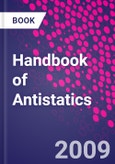This is the first comprehensive handbook written on the subject of antistatic additives for polymers. These are additives capable of modifying properties of materials in such a way they become antistatic, conductive, and/or EMI shielding. The book contains 22 chapters, each addressing a specific aspect of properties and applications of antistatic agents. The comprehensive analysis of performance of these materials forms a critical source of information for industry, research, academia, and legislature.
Please Note: This is an On Demand product, delivery may take up to 11 working days after payment has been received.
Table of Contents
IntroductionTypes of Antistatic Agents
Typical Methods of Quality Control of Antistatics
Electrostatic Hazards
Ignition Hazards & Preventive Measures
Mechanisms of Action of Antistatic Agents
Compatibility of Antistatic Agents with Matrix and Their Performance
Antistatic Agent Motion and Diffusion
Structure and Distribution of Non-migrating Antistatics
Antistatic Agent Incorporation Method and Its Performance
Antistatic Agents and Other Components of Formulation
Effect of Antistatic Agents on Some Properties of Compounded Materials
Antistatic Agent Selection for Specific Polymers
Antistatic Agents in Polymer Blends
Antistatic Agents in Various Industrial Products
Antistatic Agents in Various Processing Methods
Specialized Analytical Methods in Antistatic Agent Testing
Mathematical Modelling of Antistatic Properties
Health and Safety Issues with Antistatic Agents
The Environmental Fate of Antistatic Agents
Regulations and Data
Personal Protection








